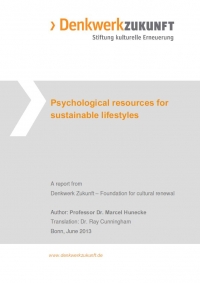Back to Contributions and Publications
Psychological resources for sustainable lifestyles
The way people live in the early industrialized countries, and increasingly also in the newly industrialized countries, is not sustainable, as it exceeds the limits to the carrying capacity of the Earth. Sustainability therefore requires us to come back within these limits, and this in turn demands a multi-faceted transformation, not least in terms of culture, in which non-material sources will play a greater role than hitherto in sustaining individual life satisfaction and social prosperity.
As a contribution to this transformation, Denkwerk Zukunft published a report in 2011 entitled "Altering attitudes - From a culture of consumerism to a culture of prosperity" which set out suggestions for mobilizing social capacity and changing the political and legal framework to this end.
But this is not enough to overcome outmoded but deeply-rooted patterns of thought and behaviour. This aim would require in addition widespread changes in psychology which have been the subject of little research to date. It is this gap that Denkwerk Zukunft wishes to address in this report. It takes up ideas developed in a study group of the Ernst Freiberger Foundation in 2010, led by the Denkwerk Zukunft and published in its report "Content, despite declining material prosperity". It was argued there that an individual's life satisfaction depends not just on social and political conditions but is also self-determined.
The psychological resources which enable people to derive their life satisfaction substantially from non-material sources, and how to strengthen those resources, form the subject of this report, which has been written for Denkwerk Zukunft by the environmental psychologist Marcel Hunecke. In it he draws on findings from socio-ecological research, from environmental psychology, positive psychology and resource-oriented counselling, and brings these together in a systematic way for the first time in what he calls the Pleasure-Accomplishment-Meaning theory.
According to this, the cultural transformation towards sustainable lifestyles is supported above all by six psychological resources:
- the capacity for pleasure, because it increases the intensity of positive sensory experiences and works quickly and without substantial material input,
- self-acceptance, because it strengthens independence and autonomy, and thus the capacity to resist compensatory and ostentatious consumption,
- self-efficacy, because it strengthens confidence in one's own capabilities and in the belief that one's life can be shaped,
- mindfulness, because by enabling one to focus on immediate experience it opens one's eyes to needs and values which are truly important and which can therefore limit the striving for ever more material possessions,
- the construction of meaning, because it requires the individual to undertake an active search for meaning leading potentially to the discovery or strengthening of transcendent or social values that can counter unthinking, individualistic materialism,
- solidarity, because it activates positive emotions like belonging, security and trust and can thus promote a subjective well-being not based on material wealth.
Whereas the psychological resources of the capacity for pleasure, self-acceptance and self-efficacy constitute the foundations of a strong personality, the resources of mindfulness, meaning-construction and solidarity set in train processes of reflection which can bring about a turn towards non-material sources of life satisfaction. The six psychological resources are mutually supportive in this process. Moreover, they can be activated in different ways according to the individual's respective personality structure. This does not however mean making people behave sustainably by means of a kind of brainwashing. Rather, they should be empowered to find joy in non-material things and to live sustainably in a way which is self-determined.
The six psychological resources can be strengthened through targeted measures in different applications such as health promotion programmes or counselling and coaching settings. They can also be supported in different organisational or institutional settings such as schools, higher education institutes, firms, nonprofit organisations or in the wider community.
The full report can be downloaded here




